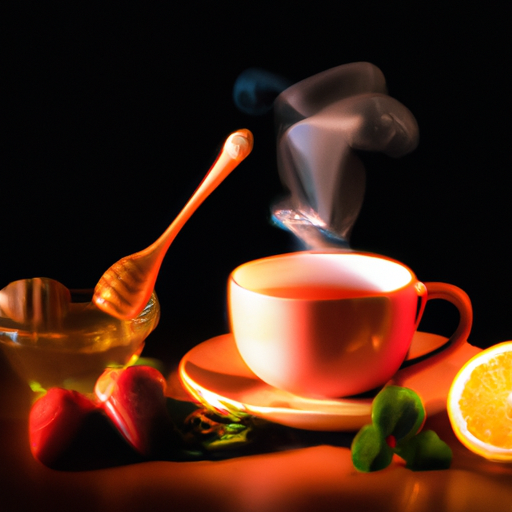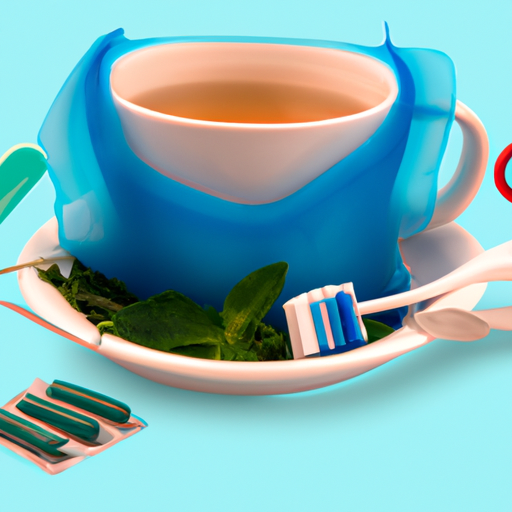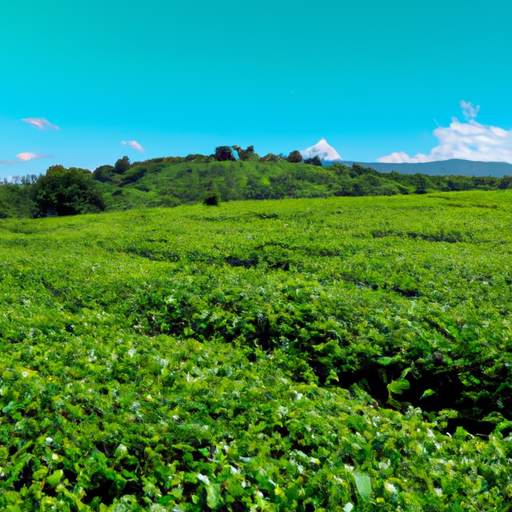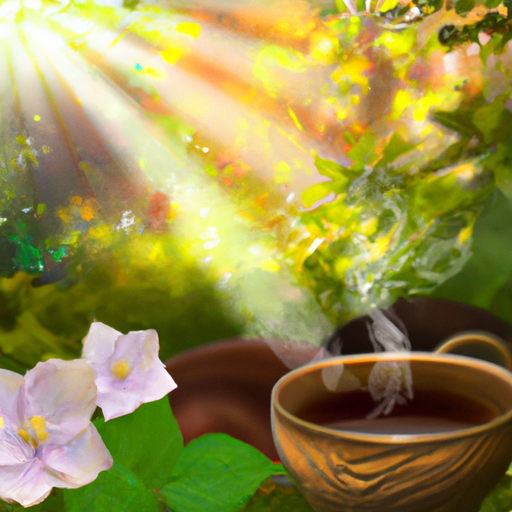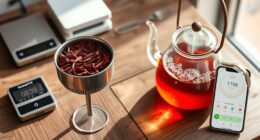Enter the realm of herbal tea, where flavors blossom and sweetness pirouettes on your taste buds. Picture yourself enjoying a cup of tea that delights your senses, without a hint of added sugar. Believe it or not, it can be done! This article will take you on a discovery of how to make herbal tea taste naturally sweet.
We all crave that touch of sweetness, but why rely on sugar when nature offers a cornucopia of alternatives? From natural sweeteners like honey and stevia to the enchanting embrace of fruity flavors, there are endless possibilities to elevate your tea-drinking experience.
Add a dash of spice or a hint of floral notes for an exotic twist, or explore the world of herbal infusions to discover unique and delightful tastes.
Balance is key, and citrus or a touch of acid can harmonize the flavors and elevate the sweetness. And don’t forget to savor the aromas that nature has to offer, as they enhance the overall sensory experience.
So, join me as we embark on a journey to make herbal tea taste sweet without sugar. Get ready to delight in the natural symphony of flavors that will leave your taste buds singing with joy.
Key Takeaways
- Natural sweeteners like honey or stevia can be used to make herbal tea taste sweet without sugar.
- Adding fruity flavors like lemon or berries can enhance the taste of herbal tea.
- Different herbal blends can enhance the natural sweetness of herbal tea without sugar.
- Adding spices or floral notes can make herbal tea taste sweeter without sugar.
Use Natural Sweeteners
If you’re looking to make your herbal tea taste sweet without sugar, try using natural sweeteners like honey or stevia. These alternative sweeteners not only add a touch of sweetness to your tea, but they also come with various health benefits. Honey, for example, is packed with antioxidants and can soothe a sore throat. Stevia, on the other hand, is a calorie-free option that can help control blood sugar levels.
When choosing a natural sweetener, it’s important to consider your personal taste preferences and any dietary restrictions you may have. Experiment with different amounts to find the perfect balance.
Once you’ve mastered the art of sweetening your tea naturally, you can enhance the flavors even further by adding fruity notes such as lemon or berries.
Enhance with Fruity Flavors
When it comes to enhancing the taste of herbal tea with fruity flavors, there are several options to consider. Adding citrus zest or juice can provide a zingy and refreshing twist to your tea. Infusing it with berries or tropical fruits can bring out a sweet and tangy flavor. Another fun way to experiment with fruity flavors is by trying out different herbal blends that incorporate various fruits and herbs. This allows you to create a unique and delicious tea experience.
Add citrus zest or juice
To enhance the flavor of your herbal tea, try adding a burst of citrus zest or juice. Not only does this add a refreshing tang to your tea, but it also brings citrus-infused sweetness without the need for sugar. Citrus fruits like lemons, oranges, and grapefruits contain essential oils that can help boost your immune system as well.
Here is a table showing different types of citrus fruits you can use to enhance your herbal tea:
| Citrus Fruit | Flavor Profile | Benefits |
|---|---|---|
| Lemon | Bright and tangy | Rich in vitamin C |
| Orange | Sweet and citrusy | High in antioxidants |
| Grapefruit | Bitter and tangy | Boosts metabolism |
By adding citrus zest or juice to your herbal tea, you can enjoy a naturally sweetened and flavorful beverage. Now, let’s move on to the next section and explore how to infuse your tea with berries or tropical fruits.
Infuse with berries or tropical fruits
Enhance the flavor of your herbal tea by infusing it with the vibrant and juicy goodness of berries or tropical fruits. Not only will this add a natural sweetness to your tea, but it’ll also create a refreshing and delightful taste experience.
Berries such as strawberries, raspberries, and blueberries are excellent options to infuse into your herbal tea. Simply crush a handful of berries and add them to your tea while it steeps.
Tropical fruits like pineapple, mango, and passion fruit can also be used to infuse your tea with a tropical twist. These fruits not only add sweetness but also bring a unique flavor profile to your cup.
To further enhance the taste, consider exploring different herbs and alternative sweeteners such as stevia or honey. By experimenting with different combinations, you can create a customized blend that suits your taste preferences.
Transitioning into the subsequent section about experimenting with herbal blends, you can further elevate the flavor of your herbal tea by exploring various herbal combinations and discovering the perfect blend for a truly delightful tea experience.
Experiment with herbal blends
Delve into the realm of herbal alchemy and concoct unique blends that transport your taste buds to a sensory paradise. Finding the perfect herbal blend is key to enhancing the natural sweetness of your tea without relying on sugar.
Not only can herbal tea be a delicious and refreshing beverage, but it also offers numerous health benefits. By exploring different herbal blends, you can discover a multitude of flavors and aromas that’ll satisfy your sweet tooth.
Here are five herbal blends to consider:
- Chamomile and lavender: a soothing blend that promotes relaxation.
- Peppermint and hibiscus: a refreshing combination with a hint of tartness.
- Lemon balm and ginger: a zesty blend that aids digestion.
- Rooibos and vanilla: a smooth and creamy infusion with a natural sweetness.
- Rosehip and elderberry: a fruity blend packed with antioxidants.
With these herbal blends, you can create a naturally sweet and flavorful tea that’ll tickle your taste buds.
Now, let’s spice it up with some exciting additions to further enhance the taste sensation.
Spice it Up
When it comes to herbal tea, adding a little bit of spice can really jazz up the flavor and make it taste sweeter without using sugar. Experimenting with different flavor combinations and creative additions can take your herbal tea to a whole new level.
One option is to add a pinch of cinnamon or nutmeg for a warm and cozy taste. Another idea is to try a dash of ginger or cardamom for a slightly spicy and exotic flavor. You can also experiment with cloves, allspice, or even a hint of black pepper to add depth and complexity. These spices not only enhance the natural sweetness of the herbal tea but also bring a unique twist to the overall taste.
Now, let’s move on to the next section and play with some floral notes.
Play with Floral Notes
Take a moment to immerse yourself in the delicate dance of floral notes, as they weave their way through your cup of herbal tea, adding a touch of elegance and grace.
When it comes to making herbal tea taste sweet without sugar, exploring different herbs and experimenting with different combinations can open up a world of possibilities. Infusing your tea with flowers like lavender, chamomile, or rose petals can bring out their natural sweetness and add a subtle floral aroma.
You can also try blending herbs like mint, lemongrass, or hibiscus with floral notes to create a well-balanced and flavorful brew. These combinations not only enhance the taste of your tea but also provide a visually appealing experience.
Now, let’s move on to the next section and explore the art of herbal infusions.
Experiment with Herbal Infusions
Let’s dive right into the world of herbal infusions and get creative with our blends! Herbal infusions are a great way to add flavor and sweetness to your tea without using sugar.
There are different infusion techniques you can try, such as steeping herbs in hot water or cold brewing overnight. These techniques allow the flavors to fully develop and create a naturally sweet taste.
Additionally, herbal teas have many health benefits, such as soothing digestion, boosting immunity, and promoting relaxation. By experimenting with different herbs and blends, you can create a personalized tea that suits your taste preferences and provides the desired health benefits.
So let’s start brewing and exploring the wonderful world of herbal infusions! Now, let’s move on to the next section and discover how we can balance the flavors with citrus or acid.
Balance with Citrus or Acid
Enhance the flavors of your herbal infusion by adding a zesty twist with citrus or a touch of acidity. Citrus fruits like lemon, lime, and orange can bring a burst of freshness to your herbal tea and balance out its flavors. Squeeze a slice of lemon or lime into your cup of herbal tea, or add a few drops of orange juice for a subtle hint of sweetness.
The citrusy notes will uplift the taste of the herbal blend and create a harmonious balance between the citrus and sweetness. Additionally, a touch of acidity can help to round out any bitterness or earthiness in the tea, resulting in a smoother and more enjoyable drinking experience.
As we move into the next section about enjoying the natural aromas, remember that adding citrus or acidity can enhance the overall taste of your herbal tea.
Enjoy the Natural Aromas
Immerse yourself in the delightful experience of savoring the natural aromas of your herbal infusion as they transport you to a tranquil oasis of fragrant bliss. Indulge in herbal tea blends and explore different brewing methods to fully appreciate the rich and diverse flavors that nature has to offer.
Here are five items that’ll help you paint a picture of this aromatic journey:
- Lavender: Close your eyes and let the soothing scent of lavender envelop your senses, creating a calming and serene atmosphere.
- Chamomile: Breathe in the gentle aroma of chamomile flowers, known for their relaxation properties, and feel the stress melt away.
- Peppermint: Awaken your senses with the invigorating scent of peppermint, leaving you feeling refreshed and rejuvenated.
- Lemongrass: Allow the zesty and citrusy fragrance of lemongrass to transport you to a sunny tropical paradise.
- Rose petals: Delight in the delicate and romantic scent of rose petals, adding a touch of elegance to your herbal tea experience.
By fully embracing the natural aromas of herbal tea, you can enhance your enjoyment and discover a whole new world of sensory pleasure.
Frequently Asked Questions
Can I use artificial sweeteners instead of natural sweeteners?
Artificial sweeteners can be used as an alternative to natural sweeteners in herbal tea. However, it’s important to be aware of potential health concerns associated with their use. Now, let’s explore how to make herbal tea taste sweet without sugar.
How can I make my herbal tea taste sweeter without adding any additional ingredients?
To naturally sweeten herbal tea without adding any additional ingredients, try steeping the tea for longer to release more of its natural sweetness. Alternatives to sugar in herbal tea include honey, stevia, or fruit slices like lemon or orange.
Can I use honey as a natural sweetener for herbal tea?
Yes, honey is a great natural sweetener for herbal tea. However, there are also other alternatives such as stevia or agave syrup that can be used to add a touch of sweetness without sugar.
Are there any specific fruits that work best for adding fruity flavors to herbal tea?
Fruit infusions for herbal tea can add a burst of fruity flavor. To balance the sweetness with the herbal taste, try using berries like strawberries or raspberries. They provide a delightful, tangy twist to your cuppa.
How can I enhance the floral notes in my herbal tea without overpowering the taste?
To enhance the floral notes in herbal tea without overpowering the taste, I find it helpful to use delicate flowers such as rose petals or lavender. Balancing these flavors can be achieved by steeping them for a shorter time or using smaller quantities.
Conclusion
In conclusion, discovering ways to make herbal tea taste sweet without sugar has opened up a whole new world of flavors and aromas. By using natural sweeteners like honey or stevia, we can enhance the taste without compromising on health. Incorporating fruity flavors adds a refreshing twist, while spices bring warmth and depth. Floral notes allow us to indulge in the delicate beauty of nature. Experimenting with herbal infusions allows for unique combinations that surprise and delight. Balancing with citrus or acid creates a harmonious blend.
Ultimately, enjoying the natural aromas of herbal tea is a truly sensory experience that nourishes both body and soul.

